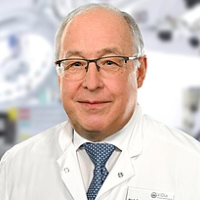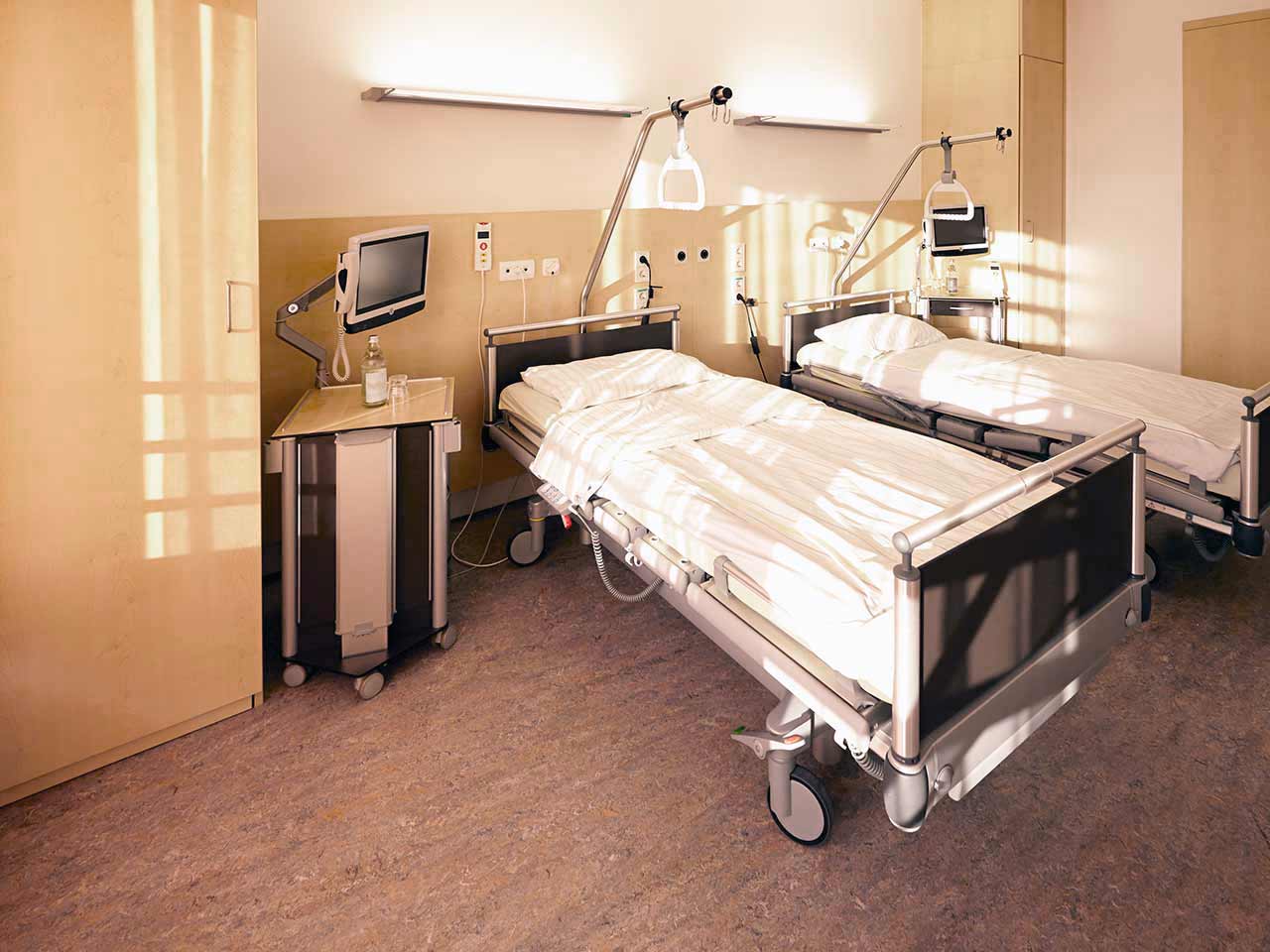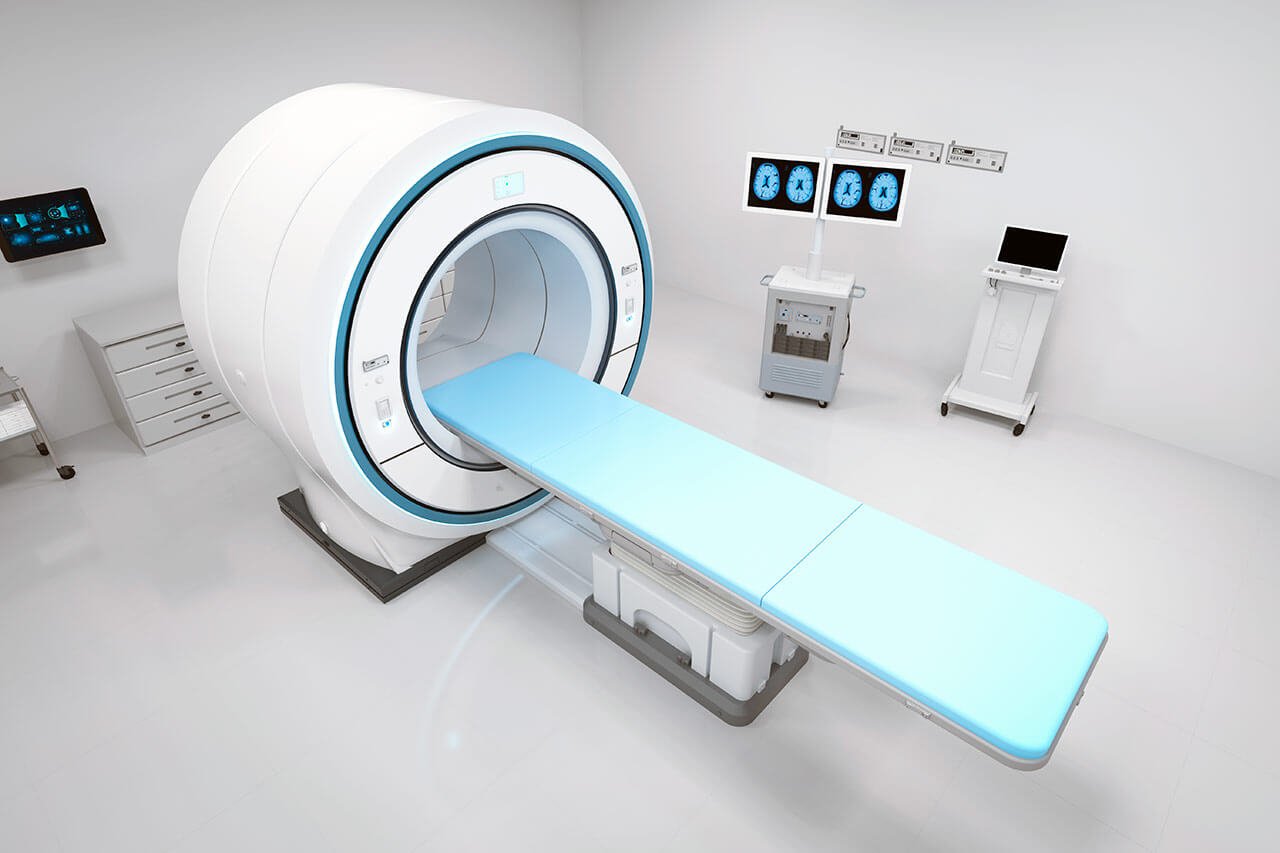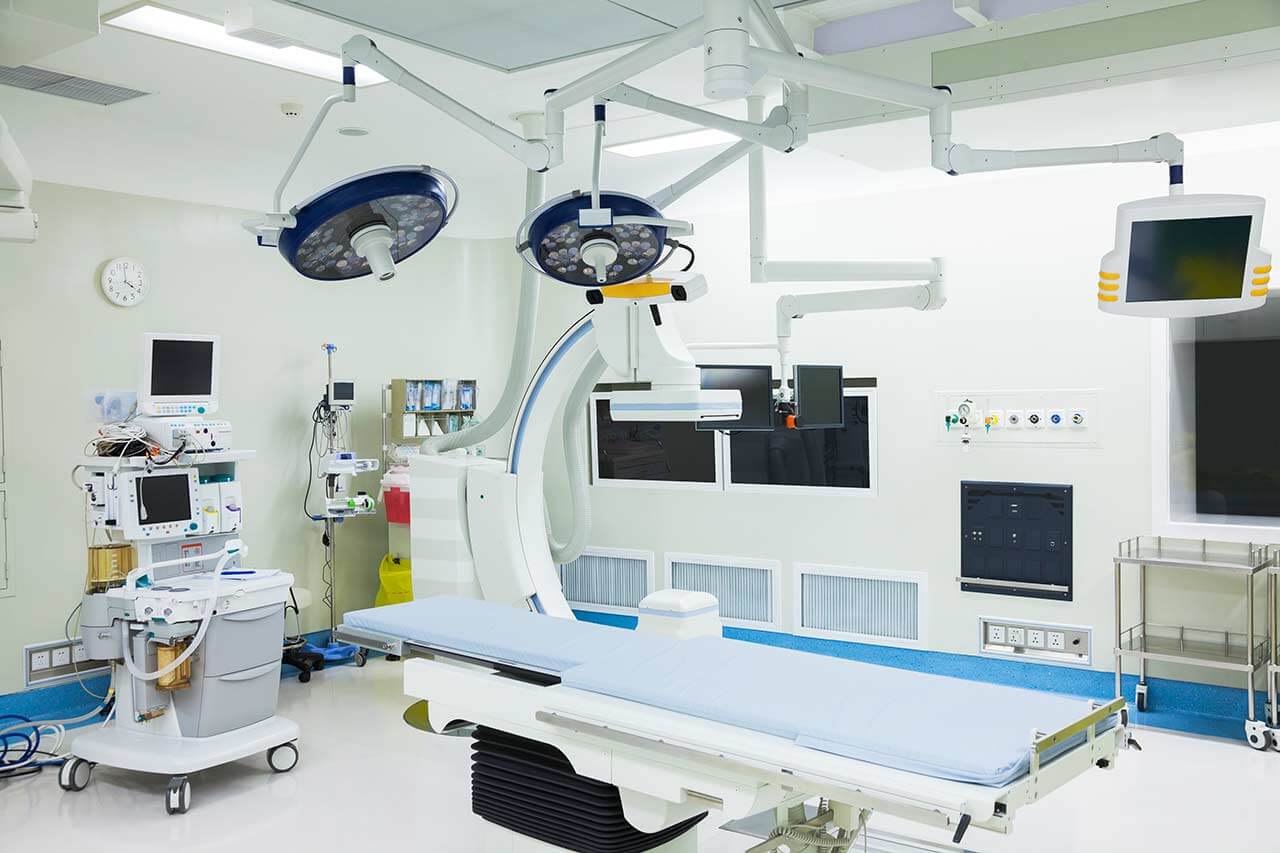
The program includes:
- Initial presentation in the clinic
- clinical history taking
- physical examination
- laboratory tests:
- complete blood count
- biochemical analysis of blood
- indicators of inflammation
- indicators blood coagulation
- ophthalmologic examination:
- ophthalmoscopy
- gonioscopy
- pachymetry
- perimetry (visual field test)
- computerperimetry
- Goldmann-primetry
- fluorescein angiography
- thermography
- capillary microscopy
- testing for optic nerve damage
- tonometry
- intraocular pressure measurement
- preparation according to preoperative standard
- treatment of congenital glaucoma with total or basal iridectomy
- symptomatic treatment
- cost of required medications
- nursing staff services
- elaboration of further recommendations
Required documents
- Medical records
Service
You may also book:
 BookingHealth Price from:
BookingHealth Price from:
About the department
The Department of Adult and Pediatric Ophthalmology at the ViDia Hospital Karlsruhe offers the full range of services for the diagnostics and treatment of diseases of the eye and its appendages. The primary clinical focuses of the department's physicians are the treatment of cataracts, glaucoma, corneal diseases, retinal disorders, and vitreous body conditions. Medical care is also provided to patients with eyelid and tear duct diseases. Doctors treat tumors, repair malformations, eliminate stenosis and obstruction, etc. The department also provides medical services to young patients with eye diseases. Doctors successfully treat strabismus, cataracts, ptosis, chalazion, and other eye diseases in children. The medical facility also regularly admits elderly patients with degenerative and age-related eye diseases. The department houses a state-of-the-art Laser Vision Correction Center, which successfully performs procedures such as LASIK, Femto LASIK, PRK/LASEK, and intraocular lens implantation. The department is the largest Eye Clinic in the region and annually treats over 45,000 patients. Such a high number of patients wishing to receive medical care here indicates a high level of patient trust and the excellent reputation of the medical facility. The department has been successfully performing clinical activities for more than 100 years, so it has gained impressive experience providing medical care corresponding to European standards. The department is headed by Prof. Dr. med. Wolfgang Lieb.
One of the most common diagnoses in the department's clinical practice is cataract. Patients with this pathology develop partial or complete clouding of the lens, which leads to visual loss. During the initial appointment, an ophthalmologist carries out the necessary diagnostic examinations, including slit lamp biomicroscopy, fundus examination, intraocular pressure measurement, and visual acuity and visual field testing. Patients with advanced cataracts are recommended for surgery because this is the only effective method to deal with this pathology and improve visual acuity. Cataract surgery involves the removal of the clouded lens and its replacement with an intraocular lens (artificial lens). The patient's own clouded lens is destroyed by ultrasound, after which its residual masses are aspirated, with the lens capsule not being removed. As a rule, the operation is performed on an outpatient basis, but a short hospital stay may be required in some cases. Following the operation, the specialist gives the patient recommendations on the care of the eye in the postoperative period. Thanks to the vast experience of the department's ophthalmologists, the success rate of cataract interventions is close to 100%, and postoperative complications occur extremely rarely.
An integral part of the department's work is the treatment of glaucoma, in which intraocular pressure increases and the optic nerve is affected due to impaired aqueous humor outflow. If left untreated, the pathology leads to irreversible blindness. At the stage of diagnosis, the patient's intraocular pressure is measured, Heidelberg retinal tomography is performed to assess the state of the optic nerve, and visual fields are tested using a computerized perimetry. Additional examination of the eye apparatus may be performed if necessary. The first-line treatment for glaucoma is the use of eye drops to lower intraocular pressure. The department also offers neuroprotective therapy to protect healthy nerve fibers in the optic nerve. This is an innovative treatment. Unfortunately, drug therapy with eye drops does not always help patients achieve the desired result, so specialists resort to a laser intervention or classical surgery. As a rule, argon laser trabeculoplasty is a second-line treatment. When performing this procedure, the doctor forms small openings in the trabecular meshwork with the help of an argon laser, as a result of which aqueous humor outflow is improved. The laser intervention is performed under local anesthesia on an outpatient basis. The last-line treatment for glaucoma is a classic surgery, during which a drainage system is placed to drain the aqueous humor. This treatment requires a short-term hospital stay.
The department has impressive experience in the treatment of eyelid diseases. The eyelids perform an important barrier function, protecting the eyeball. Constant blinking, which occurs involuntarily, prevents the cornea from drying out, so pathological changes in the eyelids may lead to corneal damage and cause vision impairments. Common eyelid problems with which the department's ophthalmologists deal are eyelid malformations (ectropion and ptosis), benign and malignant eyelid neoplasms, etc. The specialists successfully remove benign neoplasms such as warts, cysts, nevi, etc. Despite their benign nature, these changes can impair the function of the eyelids, so, in some cases, it may be necessary to remove them. The department's ophthalmologists also successfully perform resection of malignant eyelid tumors (basal cell or squamous cell cancer). Early detection and treatment of such tumors is critical. The department's doctors also specialize in aesthetic eyelid surgery, including upper and lower eyelid lifts, eye bag surgery, and other procedures.
The department also specializes in the diagnosis and treatment of infants, young children, and adolescents with visual impairments. Children with strabismus, ptosis, congenital cataracts, glaucoma, eye muscle paralysis, and other ophthalmologic conditions are often admitted to the department. The department offers a wide range of diagnostic services for young patients, including visual acuity testing, retinoscopy to determine the refractive power of the eye, binocular vision assessment, eye movement analysis, ultrasound scans, assessment of the eye structure with the PentaCAM device, high-resolution optical coherence tomography of the ocular fundus, and others. Young patients are also provided with conservative and surgical treatment. The most popular surgical interventions include eye muscle surgery, lacrimal duct probing and intubation, cataract surgery for children, and other procedures.
The department's range of medical services includes:
- Adult ophthalmology
- Diagnostics and treatment of cataract
- Surgical removal of the clouded lens (ultrasonic phacoemulsification) followed by intraocular lens implantation
- Diagnostics and treatment of glaucoma
- Conservative treatment
- Drug therapy with eye drops
- Surgical treatment
- Argon laser trabeculoplasty
- Classic interventions to place a drainage system to drain aqueous humor
- Conservative treatment
- Diagnostics and treatment of corneal diseases
- Conservative treatment
- Drug therapy with eye drops, ointments, antibiotics and other medications
- Surgical treatment
- Corneal transplantation (penetrating keratoplasty)
- Descemet's membrane endothelial keratoplasty (DMEK)
- Crosslinking
- Microsurgical excision of a pterygium in the eye
- Conservative treatment
- Diagnostics and treatment of retinal and vitreous diseases
- Conservative treatment
- Drug therapy with eye drops and pills
- Surgical treatment
- Sutureless microsurgical vitrectomy
- Intravitreal injections
- Laser interventions
- Retinal cryocoagulation
- Conservative treatment
- Diagnostics and treatment of eyelid diseases
- Surgical repair of eyelid malformations: ectropion and ptosis
- Surgical removal of benign and malignant eyelid tumors
- Eyelid surgery (blepharoplasty)
- Botulinum toxin injections for blepharospasm
- Diagnostics and treatment of nasolacrimal duct diseases
- Surgery for nasolacrimal duct obstruction
- Diagnostics and treatment of cataract
- Pediatric ophthalmology
- Diagnostics and treatment of strabismus
- Diagnostics and treatment of congenital cataracts
- Diagnostics and treatment of congenital glaucoma
- Diagnostics and treatment of endocrine ophthalmopathy
- Diagnostics and treatment of myopia
- Diagnostics and treatment of eye muscle paralysis
- Diagnostics and treatment of nystagmus
- Diagnostics and treatment of benign essential blepharospasm
- Diagnostics and treatment of ptosis
- Diagnostics and treatment of congenital nasolacrimal duct obstruction
- Other medical services
Photo of the doctor: (c) ViDia Kliniken Karlsruhe
About hospital
The ViDia Hospital Karlsruhe is a modern medical facility with a rich history and traditions. The medical complex is an academic hospital of the University of Freiburg, granting patients access to advanced university medicine and the very latest therapeutic developments. The hospital first opened its doors in 1851 and, since then, has maintained a leading position in the European medical arena. The health facility offers a state-of-the-art technical base, comfortable infrastructure, and highly qualified doctors. All this allows the hospital to provide patients with top-class healthcare in accordance with modern standards. In addition, the hospital's team honors Christian traditions, emphasizing a humane attitude towards the patient and striving to provide understanding and support.
The hospital employs a large team of specialists, consisting of over 3,200 staff members, including 400 highly qualified physicians. The medical team admits more than 50,000 inpatients every year, and about 100,000 patients are diagnosed and treated on an outpatient basis or in a day hospital. More than 3,000 babies are born in the maternity rooms of the Department of Obstetrics every year. More and more patients, including those from abroad, come to the hospital for medical care annually.
The hospital has 24 specialized departments with 25 highly certified, narrowly focused centers integrated into them. A large Cancer Center certified according to the German Cancer Society (DKG) standards also operates here. Thus, one of the main clinical focuses of the medical complex is cancer treatment. The hospital also excels in other specialties, such as general surgery, abdominal surgery, thoracic surgery, orthopedics, cardiology, endocrinology, otolaryngology, pulmonology, gastroenterology, and others. There are 37 operating rooms available here for surgical treatment, the equipment of which corresponds to the highest technical level. Priority is given to performing minimally traumatic operations using minimally invasive, endoscopic, arthroscopic, and endovascular techniques.
The ViDia Hospital Karlsruhe enjoys a high reputation in Germany and far beyond its borders. The health facility successfully combines innovative medicine with Christian values, thanks to which the patient receives not only effective treatment but also care, understanding, and support.
Photo: (с) depositphotos
Accommodation in hospital
Patients rooms
The patients of the ViDia Hospital Karlsruhe stay in comfortable single and double rooms with modern design. Each patient room has an ensuite bathroom with a shower and a toilet. The standard room furnishings include an automatically adjustable bed, a bedside table, a table and chairs, a wardrobe, a telephone, a TV, and a radio. Wi-Fi access is also available in the patient rooms.
Patients can also be accommodated in enhanced comfort rooms. These rooms are very spacious and are additionally equipped with a safe, a mini-fridge, and upholstered furniture.
Meals and Menus
The patients of the hospital are offered three tasty meals a day: breakfast is served buffet-style, and there are several set menus to choose from for lunch and dinner.
If, for some reason, you do not eat all of the foods, you will be offered an individual menu. Please inform the medical staff about your dietary preferences prior to treatment.
Further details
Standard rooms include:
![]() Toilet
Toilet
![]() Shower
Shower
![]() Wi-Fi
Wi-Fi
![]() TV
TV
Religion
There are several chapels on the territory of the hospital. Regular Catholic and evangelical services are held here. Patients can also visit one of the chapels at any time to find a quiet place to pray, if desired.
Accompanying person
Your accompanying person may stay with you in your patient room or at the hotel of your choice during the inpatient program.
Hotel
You may stay at the hotel of your choice during the outpatient program. Our managers will support you for selecting the best option.





